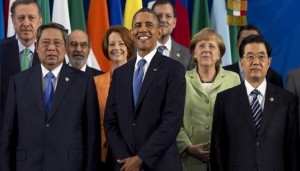Progress Made in Degrading ISIL Oil Revenues, Official Says: Lisa Ferdinando
The coalition is carrying out relentless strikes against ISIL targets in Iraq and Syria, while partners on the ground are rooting out terrorists from towns and neighborhoods, Obama told reporters at the Pentagon during a press briefing that followed a meeting of the National Security Council.
“In recent weeks, we’ve unleashed a new wave of strikes on their lifeline — on their oil infrastructure — destroying hundreds of their tanker trucks, wells and refineries, and we’re going to keep on hammering those,” he said.
The coalition fighting the Islamic State of Iraq and the Levant has made significant progress in degrading the terrorists’ ability to profit from their oil activities, a senior U.S. official said today.
The coalition has targeted infrastructure, and trucks that transport the oil, the official said, speaking to reporters on background at the Pentagon. Oil is the single largest revenue generator for the terrorist group, he noted.
“The cost of that barrel now has increased for ISIL to be able to sell it, and the entire operation is less effective,” the official said.
Strategies to Degrade
Over the course of about a year, U.S. officials examined ways to degrade ISIL’s ability to profit from the oil, the official said. Bombing oil fields was not the answer, he added.
“The problem is it’s not that easy — it doesn’t work that way,” he said. “You can’t simply bomb a well; it doesn’t do very much,” he said. The terrorists simply would rebuild or find a workaround, he explained.
Taking out the refineries reduces the quality and value of the oil, the official told reporters. Strikes targeted wellheads, he said, but the terrorists were able to figure out how to rebuild them.
‘Significant Progress’
A U.S. special operations raid in Syria in May killed Abu Sayyaf, ISIL’s “oil emir,” and netted an enormous amount of detailed information on how ISIL ran its energy sector, he said.
The coalition began seeking out more strategic targets that are harder to replace, the official said. Operation Tidal Wave II, named after the allied effort against Nazi oil targets, is several weeks old. It targets ISIL’s oil distribution chain, including the oil tankers, the “veins” of the operations, the official said.
The official commented that there are fewer truck drivers on the road and less oil to transport. It takes longer to move the oil, and the drivers are charging more, he said.
Most of the oil from Syrian oil fields, the official said, is believed to be distributed in the surrounding area. Officials do not believe much smuggling is going on from ISIL territory into Turkey. If there is, he added, it is a very small amount.
ISIL does not control any oil fields in Iraq, and the Iraqi oil fields that are contested are not producing any oil, he said.
The coalition efforts, he said, are “enormously successful” and have resulted in moving ISIL oil production from a “20th-to-21st century operation” to a “17th-century mode of operation.”
“We have made significant progress,” he said. “We have already affected their ability to generate the revenues, and they are starting to see the trouble of the ability to govern by having shortages of the fuel types that they require.”



